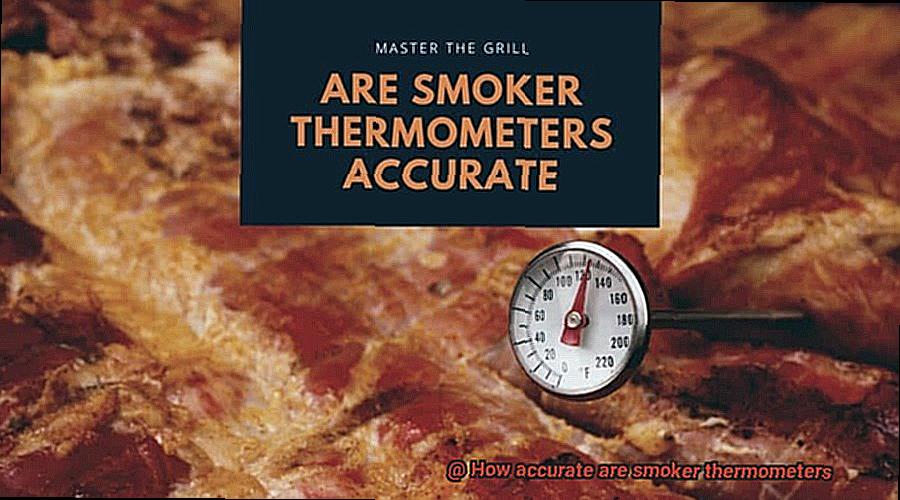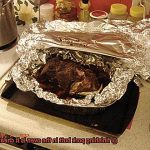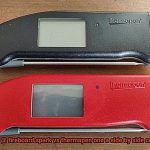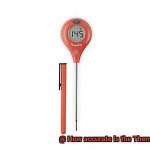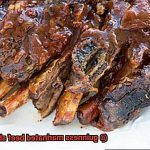Imagine the mouthwatering aroma of slow-cooked ribs, the satisfying sizzle of steak hitting the grill, and the excitement of that perfectly cooked piece of meat. But here’s a secret: achieving barbecue nirvana could all come down to the accuracy of your smoker thermometer.
That’s right, these little gadgets have become essential for pitmasters and grill enthusiasts everywhere, helping them keep a close eye on their smoker’s temperature. But let’s get real for a moment – just how accurate are these trusty tools?
So grab your apron and tongs because we’re about to embark on a temperature adventure that will have you grilling like a pro in no time.
Contents
Types of Smoker Thermometers
Ready to take your grilling adventures to new heights? A smoker thermometer is an indispensable tool that ensures your food is cooked to perfection every time you fire up the grill. But with a plethora of options available, how do you choose the right one for you? Let’s explore the different types of smoker thermometers, each with its own unique advantages and disadvantages, so you can find the perfect tool to enhance your grilling experience.
Analog Thermometers: Simple and Affordable, Yet Less Precise
Analog thermometers are the quintessential classics, sporting a dial or gauge to display the temperature. They are budget-friendly and easy to use. However, they may not deliver pinpoint accuracy due to factors like humidity and altitude, making them less reliable for precise temperature control. Yet, they remain popular among traditionalists who appreciate their simplicity and affordability.
Digital Thermometers: Precision at Your Fingertips
If accuracy is your top priority, digital thermometers are a must-have. These high-tech devices utilize electronic sensors to measure and display temperature digitally. Renowned for their precision, digital thermometers are favored by grillers who refuse to compromise on perfectly cooked meats. Some models even come equipped with additional features such as timers, alarms, and wireless connectivity for remote monitoring.
Wireless Thermometers: Monitor from Afar
Wireless smoker thermometers have revolutionized the grilling experience for those who crave freedom and convenience. Comprising a transmitter inside the smoker and a receiver displaying real-time temperature data, these thermometers allow you to monitor your cook from a distance. No more hovering around the grill or interrupting conversations with guests—simply relax and keep an eye on your masterpiece from afar.
Multiple Probe Thermometers: Juggle Multiple Meats with Ease
Cooking multiple meats simultaneously without compromising on flavor and tenderness can be a daunting task. Enter multiple probe thermometers, which enable you to monitor the temperature of multiple pieces of meat at once. No more guesswork or repeatedly opening the smoker and losing precious heat. With this handy tool, each piece of meat can be cooked to perfection, ensuring culinary harmony on your plate.
Infrared Thermometers: Quick and Contact-Free Readings
Infrared thermometers bring a touch of futuristic technology to your grilling arsenal. These sleek devices measure temperature without direct contact using infrared technology. By detecting the thermal radiation emitted by objects, they provide quick and contact-free temperature readings. However, it’s important to note that while they offer convenience and speed, they may not always provide the same level of accuracy as other types of thermometers.
Remember, the accuracy of smoker thermometers can vary depending on the brand and model. Investing in a high-quality thermometer from a reputable manufacturer is recommended for precise results. Additionally, regular calibration and maintenance are crucial to ensure accurate readings over time.
Accuracy of Analog Dial Thermometers
Accurate temperature control is the key to perfectly grilled meats. And when it comes to analog dial thermometers, their accuracy is a topic worth exploring. These familiar devices, with their metal probe and easy-to-read dial, are commonly found in smokers and grills. However, it’s important to note that their accuracy can vary.
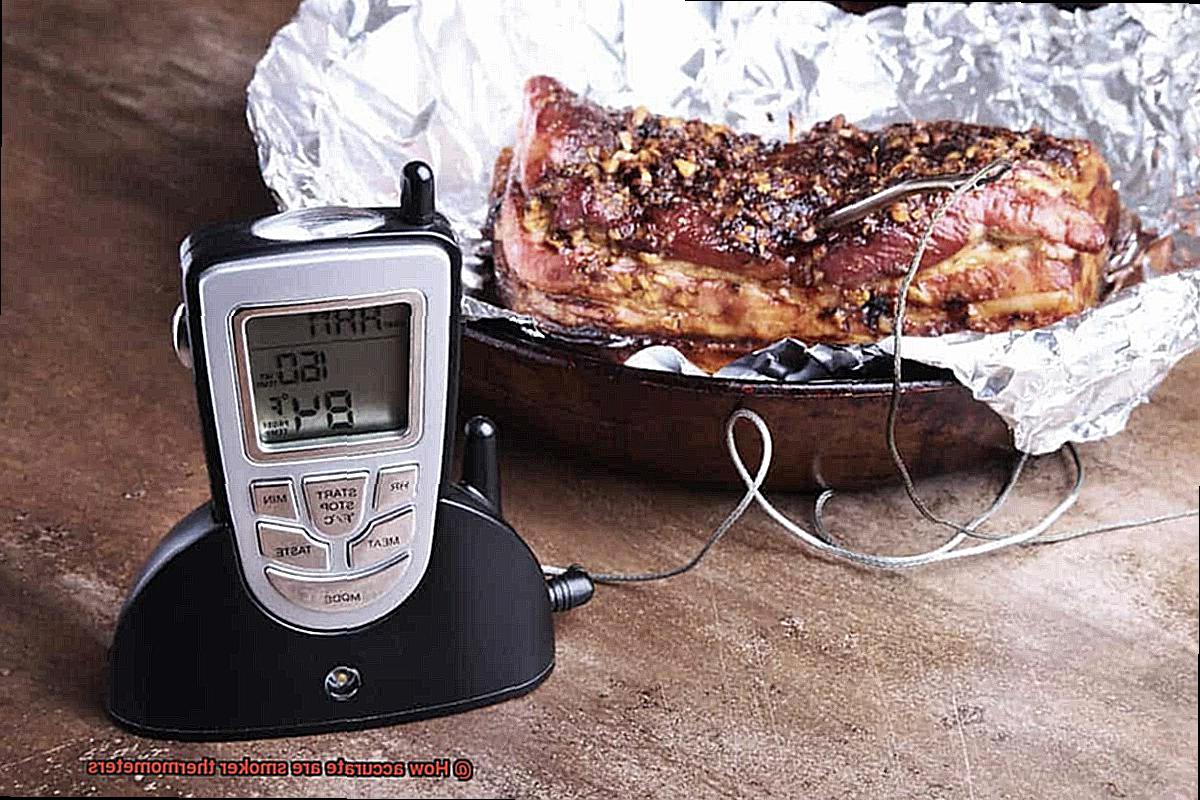
Manufacturing quality, calibration, and usage conditions all play a role in determining the accuracy of analog dial thermometers. Each thermometer has a tolerance level, which means it may not provide precise temperature readings. So, don’t be surprised if your thermometer shows a slight deviation from the actual temperature.
There are ways to improve the accuracy of your analog dial thermometer. Here are some tips:
- Regular calibration: Analog dial thermometers, like any other measuring instrument, need to be calibrated regularly. Compare its readings with a known accurate reference, such as a digital thermometer or an oven thermometer. Significant deviations may require adjustment or replacement.
- Proper positioning: Placement matters. Ensure your analog dial thermometer is positioned correctly in the smoker or grill for accurate readings. Placing it too close to the heat source or in an area with uneven temperature distribution can result in inaccurate readings.
- Handle with care: Analog dial thermometers can be delicate creatures. Exposure to extreme temperatures, moisture, and physical damage can all affect their accuracy. Handle them with care and avoid subjecting them to harsh conditions.
While analog dial thermometers may not offer precise measurements, they still provide a general indication of the temperature in your smoker or grill. However, if you’re seeking more accurate temperature monitoring, consider digital thermometers with probe attachments. These high-tech gadgets offer precision at your fingertips and can take your grilling game to the next level.
Accuracy of Digital Thermometers
Well, fret not. The secret to grilling greatness lies in the precision of temperature readings, and digital thermometers are here to save the day.
Digital thermometers are the superheroes of temperature measurement, equipped with a user-friendly digital display that effortlessly reveals and interprets the results. But what sets them apart from their analog counterparts? It’s all about accuracy, my friends.
Delving into the science behind these trusty devices, let’s explore the factors that determine their precision:
- Battery Life: The accuracy of your digital thermometer relies on a steady power source. Keep fresh batteries at hand to avoid fluctuations in readings that could throw off your culinary masterpiece.
- Sensor Quality: The heart and soul of any thermometer lie in its sensor. Top-notch sensors are meticulously designed to provide precise and consistent readings, even amidst the blazing inferno of grilling.
- Calibration Drift: Over time, digital thermometers may experience slight calibration drift, leading to inaccurate temperature readings. Regular calibration checks work wonders in maintaining accuracy and ensuring your grill game remains unmatched.
- Automatic Calibration and Self-Check Mechanisms: Some digital thermometers come adorned with nifty features that automatically calibrate or perform self-checks to ensure unrivaled precision. These added bonuses save you time and effort while guaranteeing dependable readings.
- Certified Accuracy: Take your grilling prowess to new heights by opting for digital thermometers certified by trusted organizations like the National Institute of Standards and Technology (NIST). These thermometers have undergone rigorous testing to offer accuracy you can rely on.
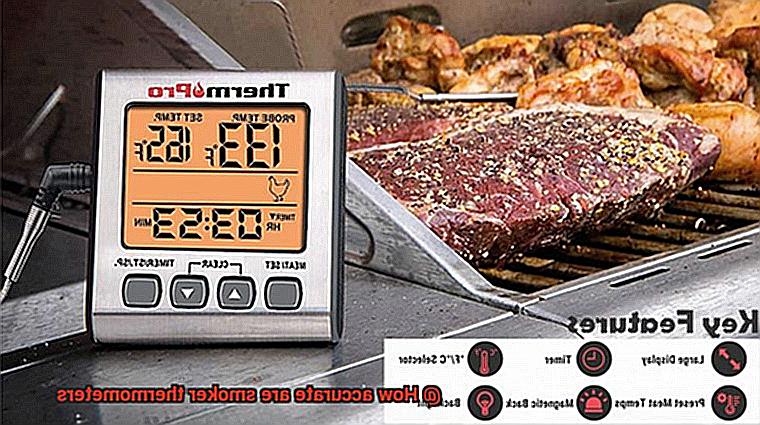
Remember, following the manufacturer’s instructions and adhering to proper usage and maintenance guidelines are paramount in obtaining accurate temperature readings. Treat your digital thermometer with utmost care, and it will reward you with precise results every time.
So, whether you’re igniting the grill to create a flavor-packed storm or perfecting the art of slow smoking, accurate temperature readings are your secret weapon. Don’t leave your culinary success to chance – equip yourself with a digital thermometer that provides unwavering precision.
Accuracy of Remote Wireless Thermometers
Fear not. Remote wireless thermometers are here to save the day, offering unrivaled convenience and accuracy. But just how accurate are these thermometers? Let’s delve into the factors that influence their precision and unlock the secrets to grilling success.
Quality Matters:
Investing in a top-notch remote wireless thermometer is paramount. Cheaper alternatives may compromise on accuracy, leaving you with potentially undercooked or overcooked food. Opt for reputable brands known for their precision to guarantee accurate temperature readings every time.
The Range Game:
Imagine this: you’re sipping a cold beverage on your patio while your meat sizzles away on the grill. Suddenly, you realize you’ve wandered beyond the thermometer’s range. Oops. Mind the distance between the transmitter (probe) and receiver (display) to maintain signal strength and accuracy. Choose a thermometer with an adequate range based on your grilling setup.
Environmental Conditions:
Mother Nature can sometimes throw a wrench into our grilling plans. Extreme temperatures, humidity, and interference from electronic devices can all impact the accuracy of remote wireless thermometers. Place the transmitter away from direct heat sources and other potential interferences to ensure precise temperature readings.
Calibration is Key:
Just like any superhero gadget, remote wireless thermometers need occasional calibration to maintain their accuracy. Follow the manufacturer’s instructions for calibration or seek professional assistance if needed. Don’t let a small adjustment compromise your grilling masterpiece.
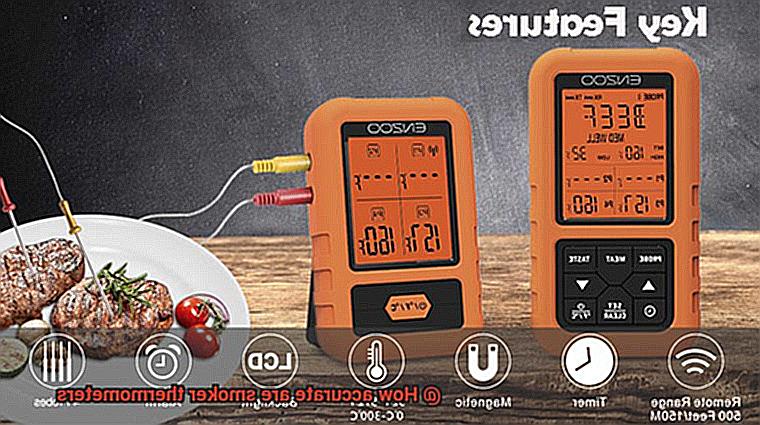
The Power of Reviews:
In our digital age, customer reviews are like secret weapons for making informed decisions. Read up on other grillers’ experiences with different models and seek out reputable sources to gain insights into which remote wireless thermometers are known for their accuracy and reliability.
Calibration and Maintenance for Accurate Readings
Grilling is an art form that requires precision and accuracy, especially when it comes to temperature readings. To achieve culinary perfection, you need a reliable smoker thermometer. However, like any other tool, it requires regular calibration and maintenance to ensure accurate readings. In this comprehensive guide, we will walk you through the steps necessary to calibrate and maintain your smoker thermometer, guaranteeing the best grilling results every time.
Calibration:
- Gather your tools: To calibrate your smoker thermometer, you’ll need a reliable reference point. This can be an accurate digital thermometer or an ice bath for low temperatures and boiling water for high temperatures.
- Ice bath calibration: Create an ice bath by filling a container with crushed ice and a small amount of water. Stir until it reaches a slushy consistency. Insert the thermometer probe into the ice bath, ensuring it doesn’t touch the sides or bottom of the container. The thermometer should read 32°F (0°C) or very close to it.
- Boiling water calibration: Bring a pot of water to a rolling boil. Insert the probe into the boiling water without touching the sides or bottom of the pot. The thermometer should read 212°F (100°C) or very close to it at sea level.
- Altitude adjustment: If you live at a higher altitude, consult an altitude adjustment chart provided by the thermometer manufacturer to make necessary calibration adjustments.
Maintenance:
- Cleanliness is key: After each use, clean the probe with warm soapy water and dry it thoroughly before storing. Avoid submerging any part that isn’t waterproof.
- Dishwasher safe probes: If your smoker thermometer has detachable probes that are dishwasher safe, take advantage of this feature for effortless cleaning.
- Protect from extreme temperatures: Avoid exposing your thermometer to direct heat or flames, as extreme temperatures can affect its accuracy. Store it in a cool, dry place when not in use.
- Regular inspections: Routinely inspect the thermometer for any cracks, discoloration, or abnormalities. If you notice any signs of damage or wear, consider replacing it to maintain accuracy.
Factors Affecting the Accuracy of Smoker Thermometers
Imagine a picturesque summer day, the tantalizing aroma of sizzling meat filling the air, and you, the grilling maestro, tending to your smoker with confidence. But hold on, can you trust your smoker thermometer to provide accurate temperature readings? Don’t let your culinary masterpiece go up in smoke.
In this comprehensive guide, we’ll delve into the crucial factors that can affect the accuracy of smoker thermometers. Get ready to achieve temperature perfection every time you fire up your grill.
Calibration: The Secret Sauce to Accuracy
Just like a musician tunes their instrument before a performance, calibrating your smoker thermometer is vital for precise readings. Over time, thermometers can lose accuracy due to temperature fluctuations and physical impact. Regular calibration ensures that your thermometer displays precise measurements. Grab a glass of cold water and follow our step-by-step calibration process to ensure accuracy and eliminate guesswork.
Temperature Range: Choosing the Right Tool for the Job
Not all smokers are created equal, and neither are their temperature ranges. To achieve mouth-watering results, it is essential to select a thermometer that can handle the specific temperature range required for your smoker. Using a thermometer with a limited range might lead to inaccurate readings, leaving your food overcooked or underdone. Choose a thermometer with a broad temperature range to cover all your grilling needs.
Placement and Positioning: Finding the Sweet Spot
The placement and positioning of your smoker thermometer inside the grill can significantly impact its accuracy. Placing it too close to the heat source or in the direct path of smoke can skew the readings. Instead, position the thermometer where it reflects the average temperature inside the smoker for precise measurements every time. Find that sweet spot that represents the true temperature within your cooking chamber.
Quality and Construction: Investing in Excellence
When it comes to smoker thermometers, quality matters. Cheaply made models may struggle to withstand high temperatures or resist damage, leading to fluctuating accuracy. Invest in a well-constructed thermometer that can handle the heat and deliver consistent and reliable results. A high-quality thermometer will be your grilling companion for years to come, ensuring your cooking game is always on point.
Ambient Conditions: Mother Nature’s Wild Card
While we can’t control the weather, we can take it into account when using smoker thermometers. Factors like wind, rain, or extreme temperatures outside the smoker can influence the temperature inside, potentially affecting the accuracy of your readings. Be mindful of these ambient conditions and adjust your cooking technique accordingly. Consider using windbreaks or shields to minimize their impact on your smoker’s temperature.
Precise Temperature Control with High-Quality Thermometers
If you’re looking to take your grilling game to the next level and achieve temperature perfection every time, investing in a high-quality thermometer is an absolute must. Don’t settle for mediocre results when you can elevate your cooking with precision and finesse. Let’s delve into why top-notch thermometers are the secret ingredient to becoming a true grill master.
Accurate Temperature Control:
In the world of grilling, precise temperature control is the key to unlocking mouthwatering flavors and juicy tenderness. High-quality thermometers are designed to accurately measure the internal temperature of your grill or smoker, allowing you to monitor and adjust the heat as needed. Bid farewell to undercooked or overcooked meats and say hello to perfectly grilled goodness.
Advanced Features for Convenience:
Top-of-the-line thermometers come equipped with advanced features that make grilling a breeze. Imagine having a digital display that shows you the exact temperature in real-time or multiple probes that allow you to monitor various meats simultaneously. Some even offer wireless connectivity, so you can keep an eye on your cooking from anywhere in your backyard. With these features, achieving precise temperature control has never been easier.
Confidence in Accuracy:
When it comes to thermometers, quality matters. Cheaper or lower-quality models may give you inaccurate readings, leaving you guessing and potentially ruining your culinary masterpiece. On the other hand, high-quality thermometers are calibrated and tested, ensuring accurate measurements every time. By trusting your thermometer, you can trust your cooking skills.
Proper Calibration for Consistency:
To maintain accuracy, regular calibration of your thermometer is crucial. This involves comparing its reading to a known reference point, such as boiling water or an ice bath. Some high-quality thermometers come with built-in calibration features or include detailed instructions on how to calibrate them effectively.
By calibrating your thermometer, you’ll achieve consistent results and become the grill master you were meant to be.
Durability and Versatility:
Investing in a high-quality thermometer means investing in durability and versatility. These thermometers are built with robust materials that can withstand high temperatures and prolonged use. They offer ease of use, allowing you to set desired temperature ranges or alarms for precise monitoring and control. Some even offer smartphone connectivity, so you can keep tabs on your cooking progress from the comfort of your lounge chair.
Variations in Temperature Readings
Today, we embark on an exciting journey into the realm of temperature control, uncovering the enigmatic variations that can occur in smoker thermometer readings. So, grab your trusty tongs and join us as we dive deep into the world of accurate grilling temperatures.
The Quality of the Thermometer:
Investing in a top-notch thermometer is paramount to obtaining precise temperature readings. Cheaper thermometers may fall short in terms of accuracy, making it worthwhile to opt for more expensive models with reliable reviews, meticulous calibration, and robust construction. By selecting a high-quality thermometer, you ensure consistent performance during every grilling session.
Placement within the Smoker:
The strategic placement of your thermometer within the smoker can significantly impact its ability to measure temperature accurately. To achieve reliable readings, position the thermometer in a spot that represents the overall temperature in the cooking chamber. Avoid proximity to hotspots or direct exposure to heat sources, as these factors can lead to misleading readings.
Type of Smoker:
Different types of smokers, such as charcoal, electric, or gas smokers, exhibit diverse temperature distribution patterns. Familiarizing yourself with your specific smoker’s behavior is key to interpreting thermometer readings correctly. Understanding these nuances allows you to adapt your cooking techniques accordingly and achieve optimal results.
External Factors:
Mother Nature loves to throw us curveballs, and weather conditions like wind or extreme temperatures can influence the accuracy of smoker thermometers. Wind can cause temperature fluctuations within the smoker, resulting in inconsistent readings. It is crucial to remain mindful of these external factors and consider using windbreaks or shields when necessary to maintain consistent temperature control.
Calibrating for Accuracy:
Regular calibration of your thermometer is a simple yet effective way to ensure unwavering accuracy. Performing a boiling water test or ice water test periodically verifies that your thermometer is precisely reading temperatures. Keep an eye out for any discrepancies in readings as they may indicate the need for recalibration.
Multiple Thermometers:
Enhance your temperature monitoring capabilities by using multiple thermometers placed strategically within the smoker. This approach allows you to gauge temperature variations throughout the cooking chamber, providing a comprehensive understanding of the overall temperature profile. Additionally, having multiple thermometers acts as a reliable backup, instilling peace of mind during your grilling adventures.
Digital Thermometers and Meat Probes:
While some smokers come equipped with built-in thermometers, separate digital thermometers with meat probes offer unparalleled accuracy. Inserting these probes directly into the meat ensures precise readings, eliminating guesswork when determining doneness. Unlock the true potential of your grilling prowess with these advanced temperature-monitoring tools.
wgrvWUmK74w” >
Conclusion
Smoker thermometers, although widely used, may not always provide the precise temperature readings we desire. It’s important to understand that these devices can have a margin of error, meaning they may not be 100% accurate. This discrepancy can be attributed to various factors such as calibration issues, placement of the thermometer, and external environmental conditions.
While some smoker thermometers boast high accuracy levels, it’s crucial to remember that even the most advanced models can still have slight deviations from the true temperature. These deviations can range from a few degrees to several degrees Fahrenheit or Celsius.
To ensure the best possible accuracy, it is recommended to calibrate your smoker thermometer regularly using an ice bath or boiling water test. This process helps correct any potential inaccuracies and ensures more reliable temperature readings.
Furthermore, the placement of the thermometer probe plays a significant role in obtaining accurate results. Placing it too close to the heat source or in an area with inconsistent airflow can lead to misleading readings. It is advisable to position the probe in the thickest part of the meat being cooked for more accurate temperature measurements.
External environmental conditions also affect smoker thermometer accuracy. Factors such as wind, rain, and extreme temperatures can impact how well these devices function. Shielding your smoker from strong winds or adverse weather conditions can help mitigate these effects.
In conclusion, while smoker thermometers are valuable tools for monitoring cooking temperatures, they may not always provide pinpoint accuracy. Understanding their limitations and taking necessary precautions like regular calibration and proper probe placement will help improve their reliability.

